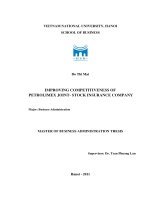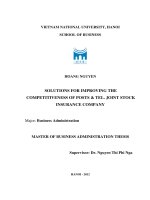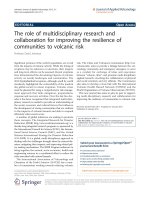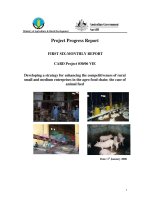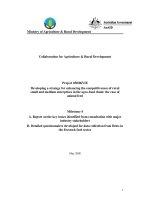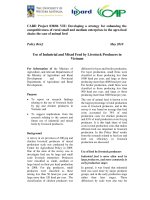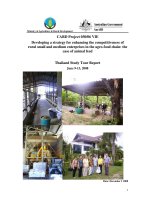Solutions For Improving The Competitiveness Of Posts Tel. Joint Stock Insurance Company
Bạn đang xem bản rút gọn của tài liệu. Xem và tải ngay bản đầy đủ của tài liệu tại đây (309.62 KB, 25 trang )
VIETNAM NATIONAL UNIVERSITY, HANOI
SCHOOL OF BUSINESS
HOANG NGUYEN
SOLUTIONS FOR IMPROVING THE
COMPETITIVENESS OF POSTS & TEL. JOINT STOCK
INSURANCE COMPANY
Major: Business Administration
MASTER OF BUSINESS ADMINISTRATION THESIS
Supervisor: Dr. Nguyen Thi Phi Nga
HANOI - 2012
TABLE OF CONTENTS
ACKNOWLEDGEMENT
ABSTRACT
TÓM TẮT
TABLE OF CONTENTS
LIST OF TABLES
LIST OF FIGURES
LIST OF DIAGRAM
CHAPTER 1: BASIC ARGUMENTS ON COMPETITIVENESS IN NON-LIFE
INSURANCE BUSINESS
1.1 Concept and feature of insurance business activity
1.1.1 Concept on insurance business activity
1.1.2. Feature of insurance business activity
1.2. Non-life insurance business activity
1.2.1 Concept on non-life insurance business
1.2.2. Operation content of non-life insurance enterprise
1.2.3. Criteria for evaluating the product’s competitiveness capacity
1.2.4 Necessity to improve competitiveness capacity of product in international
economic integration condition
1.3. Overview of non-life insurance market in 2011
1.4. Competitiveness capacity of non-life insurance enterprise
1.4.1. Competitiveness and competitiveness forms
1.4.2. Competitiveness capacity of non-life insurance enterprise
1.4.3. Factors reflecting competitiveness capacity of non-life insurance enterprise
1.4.4. Some factors affecting to competitiveness capacity of non-life insurance
enterprise.
CHAPTER 2: REAL SITUATION OF COMPETITIVENESS CAPACITY OF
POSTS & TEL. JOINT - STOCK INSURANCE COMPANY (PTI)
2.1. Introduction about Posts & Tel. Joint - Stock Insurance Company (PTI)
2.1.1. Introduction about the Company
2.1.2 Apparatus organization of PTI
2.2. Some features on competitiveness situation in non-life insurance market in
Vietnam at present.
2.2.1. Number of insurance enterprises:
2.2.2. Market share of non-life insurance enterprises
2.2.3. Insurance products to be deployed
2.2.4. Distribution system of non-life insurance enterprises
2.2.5. Financial resources of enterprise
Source: Summarized by VNDIRECT
2.3. Real situation on competitiveness capacity of PTI
2.3.1. Financial capacity.
2.3.2. Product of PTI
2.3.3. Distribution system
2.3.4. Commercial partner
2.3.5. Human resources
2.3.6. Product price, assessment quality and compensation settlement
2.4. Operation result, position of PTI in the market
2.4.1. Result
2.4.2. Market share of PTI over the years
CHAPTER 3: SOME SOLUTIONS AIMED AT IMPROVING
COMPETITIVENESS CAPACITY OF PTI NON-LIFE INSURANCE
ENTERPRISE
3.1. Some recommendations for the State to improve the competitiveness capacity on
non-life insurance enterprises.
3.2. Solution for PTI insurance enterprise aimed at improving competitiveness
capacity in the market
3.2.1. Constructing and developing the trade name
3.2.2. Developing and improving insurance product quality
3.2.3. Implementing statistic and costing work suitably
3.2.4. Strengthening the advertisement, communication activities:
3.2.5. Expanding distribution channel
3.2.6. Increasing financial potential of the enterprise
3.2.7. Completing apparatus organization and training human resources
3.2.8. Modernizing by application of information technology
3.2.9. Active in improving efficiency of capital investment activity
CONCLUSION
REFERENCES
1
SOLUTIONS FOR IMPROVING THE COMPETITIVENESS
CAPACITY OF POSTS & TEL. JOINT STOCK
INSURANCE COMPANY (PTI)
Hoang Nguyen
MBA Candidate 2007-2009
Vietnam National University, Hanoi
School of Business
Supervisor: Dr. Nguyen Thi Phi Nga
INTRODUCTION
1.1 Necessity of the thesis
Insurance market is considered as promising market that attracks most financial
investment co-operation. Revenue from non-life premiums increased over the years,
and accounted for a large proportion of the total revenue of insurance in the entire
market. Besides, insurance products are easy to copy. The market for non-life
insurance is a promised land which the companies are directing towards. Therefore, it
can be seen that each year the companies entering the non-life insurance market are
increasing in number. The increasing number of insurance companies will lead to the
risk of reducing the market shares of the insurance companies, non-life insurance
market of Vietnam will compete more and more severely and violently. This matter
will require every business need to form a specific business strategy suitable with
each specific period, to enhance their capacity in the market, as well as in front of the
competitors, to not be “moved” out of the non-life insurance market which is very
eventful at present. In order to develop stably and gain the expected market share,
PTI should strengthen their competitive capacity. Within the contend of this thesis,
the author propose a number of recommendations in order to increase PTI
competitive capacity.
1.2 Research aims and objectives
The aim of this thesis is to create a competitive plan for PTI with a numbers of
recommendations in order to enhance the competitive capacity of PTI in non-life
insurance market. The ulitmate aim of this thesis is to make PTI become more
2
competitive in term of more efficiency of using finance resource, human resource,
brand name exploited and so on. In order to achieve that target, there are some
objectives that should be reached:
Throughly research current theories of competitive theory including: Non-life
insurance activities, competitiveness capacity of non-life insurance company,
competitiveness forms and the necessity to improve competitive capacity.
Analysis the real situation of competitiveness capacity of PTI and point out the
position of the company in the market.
Recommendations to PTI aimed at improving competitiveness capacitiy of
PTI’s non-life insurance company.
1.3 Research questions
In order to give recommendations to improve PTI competitiveness capacity, the
thesis should finding answers for the following questions:
Why PTI need to improve their competitiveness capacity?
How to improve PTI’s competitiveness capacity?
What are solutions for PTI to improve their competitiveness capacity?
1.4 Research methodology
In the thesis, the author adopts statistic and analytical methods to identify the most
suitable solution for PTI for improving their effectiveness in administrative and
business activities in order to improve competitiveness capacity.
Both primary and secondary data used in this thesis to analyze current situation of
competitiveness capacity of PTI. Based on the theories of PTI and the author’s own
judment, the author presents the operation result and the position of PTI in the market
and gives suggestions to improve PTI’s competitiveness capacity.
1.5 Scope of the research
The thesis aims to find solutions to improve competitiveness capacity of PIT. The
thesis focus on:
Study the PTI business result in field of capital, investement activities and the
main business activities in non-life insurance.
Give suggestions to improve PTI’s competitiveness capacity.
3
1.6 Significant of the research
The thesis has both theoretical and realistic significance. The thesis provides a review
of competitive theories that cover many aspects of business activities including: cost
management, human resource administration, finance management and
communication.
The thesis also provides the recommendations that are applicable to the curren
competitive activities of PTI
4
CHAPTER 1: BASIC ARGUMENTS ON COMPETITION IN
NON-LIFE INSURANCE BUSINESS
1.1 Concept of insurance business activity
It can be understood that insurance business is the activity of the insurance company
aimed at revenue-earning, thereby insurance company accepts the risk of the
insurance buyer on the basis that the buyer pays the premium so that the company
pays the insured amount to the beneficiary or compensates the insurance buyer as
happening the insured events.
1.2. Non-life insurance business activity
1.2.1 Concept on non-life insurance business
Non-life insurance is still used as a general concept with the significance containing
all operations of damage insurance (property insurance, civil liability insurance) and
human insurance operations not belonging to the life insurance (accident insurance,
disease and illness insurance…). According to the law on insurance business of
Vietnam, the term of non-life insurance is explained as follows: “Non-life insurance
is the type of insurance operations for property, civil liability and other insurance
operations not belonging to life insurance”.
1.2.2Reinsurance business
Reinsurance is the operations which the insurer use to transfer a liability part
accepted with the person insured for one any many other insurers on the basis of
transferring to that person a part of the premium.
Reinsurance is a very important activity and always goes abreast with the original
insurance business; it is considered as the shield for the operation of each insurance
company, a form which the insurance company insures for itself after receiving all risks of
the customers. At the same time, the reinsurance activity also helps the company have
more revenue source, thus, this activity is attached special importance.
Reinsurance business includes the activity of agreeing the reinsurance and activity of
transferring the reinsurance.
1.2.3 Assessment, compensation and claim to third person
Assessment is the activity implemented directly by insurance company or through a
5
company or other assessment agent to implement the reason determination and loss
level aimed at serving the compensation settlement and payment of insured amount to
customer.
Compensation or payment of insured amount means the insurance company
implements the commitment in the insurance contract to pay the person insured a
certain amount of money as the insured event happens.
Claim to third person is the activity implemented directly by insurance company or
through a company or another intermediate agent to require the third person
compensating for the loss due to the fault of such third person after the insurance
company compensated and accepted right transfer from the person insured.
1.2.4 Investment activity
Besides the original insurance business activity of the Company, the investment
activity also brings a relatively great income source for the company. The profit
source from the investment activity helps the company improve its financial capacity
considerably; therefore, all insurance companies in the world place the investment
activity parallel with the insurance business activity, and these two activities have
assistant and supplementary relation to each other.
1.3 Overview of non-life insurance market in 2011
Non-life insurance market in 2011 attained the revenue of 20,497 billion VNĐ,
growing 17.56%, the insurance companies with foreign capital attained the revenue
of 2,013 billion Vietnam dongs, growing 55.23%. All operations grew in which
agriculture insurance increased 193%, credit and financial risk insurance increased
87%, transport goods insurance increased 43%, business damage insurance increased
37%, human heath and accident insurance increased 34%.
Leading the first is mechanical vehicle attaining 6,134 billion Vietnam dongs,
growing13%, property and equipment insurance attained 5,034 billion Vietnam
dongs, growing 24%, health insurance attained 3,323 billion Vietnam dongs, growing
34%, ship insurance attained 1,850 billion Vietnam dongs, growing 1%, transport
goods insurance attained 1,783 billion Vietnam dongs, growing 43%.
Leading the first on revenue from original insurance exploitation was Bao Viet with
6
4,900 billion Vietnam dongs, PVI 4,228 billion Vietnam dongs, Bao Minh 2,140
billion Vietnam dongs, PJICO 1,852 billion Vietnam dongs, PTI 1,095 billion
Vietnam dongs.
The companies grew with high revenue were Samsung Vina 105%, Groupama 93%,
Xuan Thanh 79%, PTI 61%, Fubon 53%, Hung Vuong 52%.
1.4 Competition capacity of non-life insurance company
1.4.1 Competition definition
Most of the countries in the world recognize competition and consider competition as
the environment and the driving force of the socio-economic development. Therefore,
competition can be understood as follows: “Competition is the race, the severe,
drastic struggle between opponents in the market in attracting customers, occupying
the market, thereby, consuming much goods and gaining high profit”.
1.4.2 Competition forms
a. Competition by product quality
To exist and stand stably in the market, the company has to determine that quality is
the objective with strategic significance, and it is the basic means to ensure that the
social-economic development is in correct direction, solid and attains high efficiency,
satisfies the demand of consumers in the market. Therefore, each company needs
attach special importance to this issue.
b. Competition on product price
The competitive strategy by price helps the company protect and increase their
market shares, and it is also the barrier preventing the joining of the potential
opponents who do not comply with the orientation of the Government, and reduces
the danger from the products having replacement ability.
c. Competition on guarantee and after sales services
As the quality of goods and service products is similar, the selling price is similar; the
competitive and winning factor is the quality of after sales service such as: warranty,
after sales service. Especially, for the companies trading in intangible service
product, this matter has greater significance.
7
CHAPTER 2: REAL SITUATION OF COMPETITION CAPACITY
OF POSTS & TEL. JOINT - STOCK INSURANCE COMPANY
2.1. Introduction about Posts & Tel. Joint - Stock Insurance Company (PTI)
2.1.1. Introduction about the Company
Posts & Tel. Joint - Stock Insurance Company (hereinafter referred to as PTI) was
issued a certificate of eligibility and conditions of operating the insurance business
No. 10TC/GCN dated 18/6/1998 by the Ministry of Finance and issued the
establishment license No. 3633/GP-UP dated 01/08/1998 by the People’s Committee
of Hanoi city. Posts & Tel. Joint - Stock Insurance Company officially went into
operation on 01/09/1998. The main activity of PTI is the business on non-life
insurance and reinsurance domestically and internationally.
The company has 07 founding members including Vietnam Post and
Telecommunications Corporation (VNPT), Hanoi Construction Corporation (HACC),
Vietnam Construction Import & Export Joint Stock Corporation (VINACONEX);
Vietnam National Reinsurance Joint Stock Corporation (VINARE), Vietnam
International Joint Stock Commercial Bank (VIBank), Bao Minh Joint Stock
Corporation (BAOMINH).
Business lines:
Original insurance business: Health insurance and human accident insurance;
Techniques asset insurance; Insurance for cargo transported by road, seaway,
waterway, railway and airway; Joint liability insurance; Mechanical vehicle
insurance; Fire and explosion insurance; Business damage insurance; Satellite
insurance; Aviation insurance; Ship insurance.
Reinsurance business: Agreeing and transferring reinsurance for all non-life
insurance operations.
Loss assessment: Assessing, investigating, calculating, distributing loss, loss
assessment agent, claim third person to compensate.
Implementing the investment activity in the following fields: Buying
government bond; Buying share, company bond; Trading in real estate; Contributing
8
capital into other companies; Lending in accordance with the regulations of credit
organization law; Depositing money at credit organizations.
2.2 Real situation on competition capacity of PTI
2.2.1. Financial capacity.
2.2.1.1 Capital ability:
Posts & Tel. Joint - Stock Insurance Company was incorporated in 1998 with the list
of shareholders and capital contribution level as follows:
Table 6: List of shareholder of PTI
(Unit: Million VND)
Charter capital
70,000
I
Legal shareholder
48,300
1
Vietnam Posts and Telecommunications Group (VNPT)
28,700
2
Bao Minh Joint Stock Corporation
7,000
3
Vietnam National Reinsurance Joint Stock Corporation - Vinare
5,600
4
Vietnam International Joint Stock Commercial Bank - VIB
2,800
5
Hanoi Construction Corporation
1,400
6
Vietnam Construction Import & Export Joint Stock
Corporation - Vinaconex
1,400
7
Posts and Communication Trading JSC., - Cokyvina
1,400
II
Natural shareholder
21,700
Source:
Over the past time, the insurance companies continuously increased their charter
capital and owner’s capital resources; the purpose is to increase the financial
capacity, business capacity of the Company. Over the past time, charter capital and
owner’s capital resources of PTI increased continuously. The charter capital of PTI in
2002 was 70 billion VND, to 2007, it increased to 150 billion VND, in 2008, it was
150 billion VND. To 2010, it reached 450 billion VND. Although the capital level of
PTI increased relatively, but when comparing with some other non-life insurance
9
companies such as Bao Viet Bao Minh, Pjico, PTI at present has capital level
belonging to average type of the market.
2.2.1.2. Reservation
Insurance has reverse business cycle; that means as the contract is signed, the
customers will have to pay to the company an amount of money namely premium (it
is called as price of insurance product), and insurance company will undertake to pay
or compensate them as the insured event occurs as agreed in the contract. Like this,
insurance company will always have in their hands a very great idle and relatively
stable capital resource, a big part will be appropriated to become a fund called
operations provident fund and the company is allowed to use this capital resource to
invest for earnings.
Table 7: Total provident fund of PTI
(period 2009 - 2011)
(Unit: billion VND)
Unit: billion VND
Content
31/12/2009
31/12/2010
31/12/2011
Provision for compensation
74,513
107,686
245,767
Provision fee not enjoyed
131,168
182,270
132,127
Provision for major fluctuation
114,938
126,166
130,227
Total operations provident
fund
320,619
416,122
508,121
Source: Consolidated auditing statement
in 2010 and consolidated financial statement in 2011
The reservation as above supplemented into the annual provident fund of PTI with
nearly 25 billion VND. To 2011, the operations provident fund of the Company
reached above 508 billion VND, thereby, ensured the high safety in the activity of
insurance business and created big idle capital resources for the financial investment
activity of PTI. This is the important financial factor creating favorable condition for
PTI in the next years.
2.2.2. Product of PTI
10
After 14 years of operation, at present, PTI had nearly 70 non-life insurance products
being divided into 3 main operations group, namely: Assets - Technique Insurance,
Cargo insurance and non-marine insurance.
Among the insurance operations deployed by PTI, the operations of assets -
techniques insurance are always the advantage of the Company; the following is the
revenue structure under the operations of PTI over some years:
Table 8: Revenue structure of PTI under operations
(period of 2007- 2011)
Operations
2007
2008
2009
2010
2011
Revenue
(bil.
VND)
Pro.
(%)
Revenue
(bil.
VND)
Pro.
(%)
Revenue
(bil.
VND)
Pro.
(%)
Revenue
(bil.
VND)
Pro.
(%)
Revenue
(bil.
VND)
Pro.
(%)
Assets -
Technique
112
37.28
148
32.52
172
29.91
169
19.44
220
17.37
Marine
25
8.37
39
8.57
45
7.82
63
7.25
63
4.97
Non-marine
156
51.66
241
52.96
360
62.6
687
79.05
970
76.61
Agreeing
reinsurance
8
2.69
27
5.93
38
6.6
50
5.75
70
5.52
Total
301
100.0
455
100.0
575
100.0
869
100.0
1266
100.0
Source: Posts & Tel. Joint - Stock Insurance Company
2.2.3. Distribution system
The head office of the Company is located in Hanoi; it is the place with crowded
population, means of transport, companies; therefore, there will be many advantages
in the exploitation and management. In 2011, the original insurance revenue of the
Company was 1266 billion VND, in which Hanoi branch accounted for 24%, Ho Chi
Minh city accounted for 33%. Da Nang accounted for 6%, Hai Phong accounted for
5%, Can Tho accounted for 4%, Dak Lak accounted for5% Like this, the biggest
11
revenue belonged to 2 big cities namely Hanoi and Ho Chi Minh city which
accounted for 50% of the revenue of the company.
At present, PTI ranks the fourth on branch network with 22 directly under units
spreading over the country. At present, the Company is using the spacious agent and
general agent system to support the sales activity. The Company constructed the
system of 360 general agents and 3900 agents all over the country.
2.2.4. Commercial partner
PTI was founded with 7 big shareholders, in which the shareholder with the biggest
equity capital is Vietnam Post and Telecommunications Corporation -VNPT Group
with the initial equity capital of 28.7 billion VND, and as at 31/12/2011, the equity
capital of the Groups increased to 162.72 billion VND (accounting 36.16% of the
charter capital of PTI insurance company).
2.2.5. Human resources
The following is the labor source structure of PTI insurance company (in Hanoi)
under the knowledge level:
Table 10: Labor structure under knowledge level
Type of labor
Quantity
Rate %
1. Postgraduate
2. Graduate
3. Junior college
4. Unskilled laborers
10
395
98
47
1.82
71.82
17.82
8.54
Total
550
100
Source: Post & Tel. Joint - Stock Insurance Company)
2.2.6. Product price, assessment quality and compensation settlement
PTI did not use price competitive strategy, which means that price of insurance
products of the company is not lower than that of other non-life insurance companies
in the market.
Product quality of insurance service is presented through the stage of assessment,
compensation of loss of each insurance company. At present, PTI is in shortage of
officers working at loss assessment stage, especially big loss with complicated
12
nature; therefore the time for settling the compensation is slow, it affects to service
product quality of the Company.
2.3. Operation result, position of PTI in the market
2.3.1. Result
Operation result and position of PTI insurance company is specific expression of
competition capacity of the company.
2.3.1.1. Original insurance revenue
Original premium revenue of the Company in the following years increased higher
than the previous years, especially in 2008 with the highest growth rate of 51.16%.
Original premium revenue in 2007 increased but very little, with the lowest increase
level (9.21%). Total original premium revenue stopped short in 2009, and in 2010, it
caught up with absolute increase level of 120 billion VND, attaining the growth rate
approximately 10%, and then reaching the figure 397 billion in 2011.
Premium revenue of each insurance operations increased but not evenly. The
premium revenue of strong point product being Assets - Technique group, although it
accounted for great proportion, the increase volume was inconsiderable. In some
recent years, the premium revenue of the non-marine insurance operations increased
greatly and exceeded the revenue of strong point product of the company.
2.3.1.2 Result of reinsurance agreeing activity
Table 13: Revenue from agreeing reinsurance over the years
(period 2007-2011)
Target
2007
2008
2009
2010
2011
1. Premium revenue from agreeing
reinsurance (Billion VND)
8
27
38
50
70
2. Uninterrupted increase volume
(billion VND)
3
21
11
12
20
3. Uninterrupted increase speed (%)
66
262
40.7
31.6
40
4. Proportion in premium revenue (%)
2.65
5.93
6.6
5.75
5.52
Source: Posts & Tel. Joint - Stock Insurance Company
13
Reinsurance revenue increased evenly over the years; however, the increase speed
was not high and was maintained at the level from 30-40%/year. Among the product
which PTI agrees the reinsurance, the main products were human insurance and fire
insurance, in which reinsurance revenue from fire insurance product always
accounted for about 50% of the total reinsurance agreement revenue.
The revenue proportion of reinsurance agreement in total premium revenue of PTI
did not account for high rate and it reduced much in some recent years. In 2011, most
of the insurance operations which PTI agreed the reinsurance reduced much in
comparison to 2010. Starting from 2010, PTI did not agree the reinsurance operations
for mechanical vehicle… Therefore, revenue proportion from agreeing reinsurance in
total premium revenue reduced from 4.11% in 2010 to 2.69% in 2011.
2.3.1.3 Investment activity
To maintain the high liquidity and develop the insurance services through network
system of the banks, the investment activity of the company is mainly focused on the
deposit at credit organizations.
To the end of 2011, total amount of money which the Company used for investment
activity was bout 1168 billion VND, real estate investment was 437 billion VND, and
capital contribution into other companies was 126 billion VND.
Table 14: Total investment value of PTI over the years
Unit: Billion VND
2007
2008
2009
2010
2011
Total investment
value
217
615
667
866
1168
Profit from
investment
29
53
61
79
118
Source: Financial Statement of PTI 2011
Over the past years, revenue from investment activity of Posts & Tel. Joint - Stock
Insurance Company continuously increased, it contributed considerably into total
revenue of the entire company. The profit from this activity always accounts for
14
extremely high proportion in total revenue, helps the company have more income
sources to cover the costs, salary payment, bonus for personnel…
2.3.2. Market share of PTI over the years
Table 15: Market share of PTI in Vietnam insurance market
(period 2007 - 2011)
Year
2007
2008
2009
2010
2011
Market share (%)
4.1
3.9
3.5
3.3
3.6
Source: Vietnam Insurance Market
In the period 2009 - 2011, the market share of PTI increased but it was
inconsiderable. In the two recent years, as our country started to enter the integration,
the market share of the company had tendency of decreasing compared with 2007. In
general, over the past years, PTI non-life insurance company always relatively small
proportion of revenue in the market, it was approximately 4%.
Although the market share of PTI ranked the 5
th
in the non-life insurance market after
Bao Viet Vietnam, PVi, Bao Minh and Pjico, the distance for these companies was
very great; the market share of PTI in the market was very modest, it was because in
the past years, PTI focuses too much on providing the insurance services in Posts and
Telecommunications sector and some other shareholders, the exploitation outside the
sector was very modest. Therefore, after 10 years of operation, the market share of
PTI does not change much and it does not actually create the prestige in the market.
15
CHAPTER 3: SOME SOLUTIONS AIMED AT IMPROVING
COMPETITION CAPACITY OF PTI NON-LIFE INSURANCE
COMPANY
3.1. Some recommendations for the State to improve the competition capacity on
non-life insurance companies.
- Completing the legal framework: In the context of the market with many
changes, the competition is more and more severe; the State needs to consider
carefully in order to have legal amendments suitable with the development objectives
and orientation of the market, the legal documents are required to create the equality
among the companies so that the competition is healthy.
-The State also needs to complete more the legal system by simplifying the
administrative procedures in general and procedures in insurance business in
particular such as business registration, license issuance… to facilitate the insurance
companies.
-Implementing the close checking, supervision of the insurance business activities in
the market: The State needs to check closely the legal implementation of the
insurance Companies, apart from the promulgation of general regulations on
operations provision and liquidity, the State also needs to supervise the execution of
these regulations of the companies. It is necessary to construct the financial target
system and way of determining the financial targets to facilitate for the checking to
be the closest and the most accurate. Thereby, it is possible to discover soon the cases
having danger of default in order to timely intervene and adjust.
-The State implements in accordance with the signed commitments as joining the
World Trade Organization, and steps up the cooperation, exchange relations with
international organizations, thereby take full advantage of technological support,
exchange experience and information, and facilitate the personnel to go for training
on insurance in advanced countries.
3.2. Solution for PTI insurance company aimed at improving competition
capacity in the market
3.2.1. Constructing and developing the trade name
16
To improve the image of the company, first, the company must care about improving
the business efficiency with all stages: product supply, contract exploitation and after
exploitation… The company supplies for customers with best products and best
serving attitude, attaches special importance to the stage of customer care, guides the
customers to select suitable products, answers every question of the customers after
signing the contract. Also, the company regularly cares, creates good relation with
customers, maybe through phone calls or sending postcard on the occasion of festival
or New Year, and guides the customers about the best way to prevent the risk.
The company must regularly renovate in the stage of claim and compensation
settlement, this stage is often the big care for customers, the settlement which is quick
and easy to understand will be the great reason for customers to renew the contract
with the Company.
To construct the best image of the Company in the eyes of customers, the company
must care about the construction of staff working professionally. The staff in the
Company should have separate uniform; besides, it is necessary to construct the
working culture in the company, working strictly and the most whole-hearted serving
attitude to customers.
In addition, marketing activities are also a big strategy of the company to help the
company popularize its name. Nowadays, information technology is developed, so
this work is more significant to an company to help the image as well as product of
the company come nearer to the inhabitants.
3.2.2. Developing and improving insurance product quality
To improve and consolidate its position in the market, each company needs to
regularly care and renovate its products. Currently, PTI has nearly 50 non-life
insurance products, first of all, the company needs to complete the existing products
in the market, and then continue to develop additionally new products on the basis of
the requirement of the market. That means the company needs to study carefully the
demand on product of the market, then it designs suitable products, it should not base
on its subjective opinions.
17
PTI also needs to attach special importance to its strong point which is technique
insurance to exploit the most absolutely. Besides, the company should have
development direction for products having big potential such as human insurance or
fire insurance - compulsory insurance operations, therefore, the revenue may be very
high; PTI must grasp this opportunity.
3.2.3. Implementing statistic and costing work suitably
Premium is considered as the price of insurance product; therefore, the costing is also
very important, affects to decision of buying goods of customer. If the fee level is too
high, it cannot attract the customer in buying insurance product, and if it is low, the
company has danger of falling into default situation. Therefore, to implement well the
reasonable costing, the insurance Companies in general need to total up all related
data: participation situation, number of loss cases, life and death situation… and
parameters on economic situation. As costing, it is necessary to care about the
parameters on interest rate, inflation… in order to have reasonable adjustment.
At present, the costing work of PTI is very passive; thus, the Company needs to invite
good expert to give professional advice to the Company on costing the most
reasonably and accurately.
3.2.4. Strengthening the advertisement, communication activities:
At present, the information technology is more and more developed; the mass media
is more and more diversified. If the insurance Companies in general and PTI in
particular wants to sell many products, it is necessary to introduce them to many
people. The most effective way may be advertisement, it is possible to stick poster,
pamphlet… Deploying PR activities to create “two-way information” relation, to
have feedback information from the customer, thereby, the company may have
suitable changes and strategies, meeting better the demand of customer.
3.2.5. Expanding distribution channel
VNPT is a big shareholder of Posts & Tel. Joint - Stock Insurance Company;
therefore, PTI should expand and develop the product distribution channel through
post office network of VNPT. The post office network of VNPT is very big; it covers
all provinces and cities of the entire country, the product distribution through post
18
offices will help PTI be able to deploy many contracts in many different regions, and
exploitation cost will be saved. This issue has great significance for the business
strategy of the insurance company, thus PTI needs attach more importance to this
distribution form.
The Company needs regularly open the training programs for agents and sales staff so
that they will operate professionally and have more responsibilities. At the same times, it
is necessary to construct the complementation and reward regime to encourage the agent
to work more effectively.
3.2.6. Increasing financial potential of the company
To improve the financial potential, first of all, the company needs increasing its
charter capital resources; the initial objective is to reach the legal capital level
stipulated by the State. Posts and Tel. Joint - Stock Insurance Company may take
some measures aimed at increasing its capital by:
-Calling the additional equity capital from shareholders: PTI was incorporated from 7
big shareholders; therefore their financial potential is rather high, in order to increase
the capital resources of the Company, first of all, it should call the equity capital from
this shareholders.
-Issuing shares to the market to mobilize the capital: this capital resource is gathered
from small idle capital resources of resident levels to form a big capital resource for
the company, help the company improve its financial ability. This mode of capital
mobilization proves to be a very effective mode which many companies are using at
present.
-The company can also increase its capital resources by supplementing from the
profit source of the company: monthly, the company will have interest accounts from
business operation of the company. In stead of being divided this profit source into
shareholders, the Company will retain (maybe a big part) to supplement into the
capital resources of the company. This profit source also contributes to increasing the
financial potential for company.
-In addition, the Company can pay dividend by share: instead of paying in cash, the
Company can issue some shares to pay dividend, and the amount of money which
19
should have paid for dividend will be retained to supplement into the capital
resources of the company.
3.2.7. Completing apparatus organization and training human resources
-Company needs complete the organizational apparatus: Management apparatus of
the company needs organizing simply but most fully, ensuring the clearance on rights
and obligations of divisions, and it is also needed to have relation between function
divisions.
-Attaching special importance to the training of human resources: PTI needs to have
training programs in concentration; however, training must be in accordance with
different directions for each object. For the management division, training the
knowledge on management activity, creation excitation, independent working at
work. For the exploitation division, it is necessary to train on professional knowledge
and skills on behaving, replying… Besides, the Company should also appoint some
staff to go for studying abroad to improve the career skill.
-Regularly monitoring closely the organizational apparatus to learn about the
situation of human resource shortage and surplus of each division for recruitment.
3.2.8. Modernizing by application of information technology
-Application in management stage:
+It is necessary to build internal website to provide information to divisions in the
Company and create the attachment relation among the divisions in the Company.
This matter also helps the information to be transmitted quickly and accurately but
does not take much time and effort.
+The management of human resources and document in computer is very convenient;
the user can look up and search necessary information the most quickly.
+It is possible to use some useful computer software such as: modern informatics
software for the statistics of risk and loss in the insurance operations.
+The Company should also use the application of working staff management at the
office: it is automatic installation system requiring enter and exit card, thus it is
possible to manage the staff entering and existing the office, and guarantee the safety
for assets of the Company.
20
3.2.9. Active in improving efficiency of capital investment activity
- The company needs to consider which branch is strong enough and has
sufficient capacity can be authorized, delivered a certain capital amount so that
branch will implement the profitable investment.
-The company needs construct reasonable portfolio: The capital resources the
company uses for investment activity are very big; therefore, it is necessary to study
carefully the investment form so that it ensures the safety and has high profit rate.
-Constructing the risk evaluation program of the investment project: Before
implementing the investment, the Company should have programs on evaluating the
risk level of the project strictly and carefully, thereby have strict decision on whether
investing or not, if investing, how much the capital amount is, so that it is possible to
avoid the loss in investment activity of the company.
-Professional training for personnel of Department of Planning - Investment:
professional knowledge of officer implementing the investment decides the efficiency
of the investment activity; therefore, the Company needs proficient officers having a
thorough knowledge of investment, regulations, international habits on investment
activity…
-The Company also needs monitor closely the investment situation in the
market in order to have suitable adjustment in each period, for example the
fluctuations on interest rate or inflation also make the company change its investment
strategy in order to help the company select the most reasonable investment forms in
each period to increase the efficiency of the investment activity.
21
CONCLUSION
Over the past years, Posts & Tel. Joint - Stock Insurance Company achieved
much success in the field of non-life insurance. Currently, PTI ranks the 5
th
position
in the market in the insurance field being traded, apart from promoting the strong
point being technique insurance operations (always accounting for great proportion in
total revenue of the market), PTI insurance company also developed some other
insurance operations and gained very high revenue level. However, PTI insurance
company has not actually created the belief from the customer; many inhabitants still
feel new as hearing about the name of this company. Furthermore, in the background
of our country which is integrating strongly into the market, there are many insurance
companies joining in non-life insurance market; the danger of being narrowing the
market share is possible to happen. As a result, the improvement of its
competitiveness in the market is an object which the company needs to direct
towards.
To improve its competitiveness in the market, especially in the integration
period at present, PTI needs to form a specific business strategy. Over the past time,
the company implemented some measures to improve its competition capacity in the
insurance market such as: increasing the financial potential, completing the
organization of management apparatus, improving the quality of service product,
expanding, diversifying the distribution channel… However, the efficiency is not
high. As a result, in the next time, PTI needs to attach more importance to its business
strategy in order to have suitable competition strategy, affirm its position and image
and stand steady in insurance market of Vietnam which is extremely eventful at
present.
22
REFERENCES
1. Nguyen Van Dinh, Insurance economics textbook, National Economics
University
2. Nguyen Van Dinh, Insurance Business Administration textbook, National
Economics University
3. Vietnam Insurance Association 2010, 2011
4. Insurance Review in 2010 and 2011
5. Insurance business law
6. David Bland, Principle and practice insurance.
7. Financial Statements of PTI in 2009, 2010, 2011.
8. Annual report of PTI in 2009, 2010, 2011.
9. Websites:
